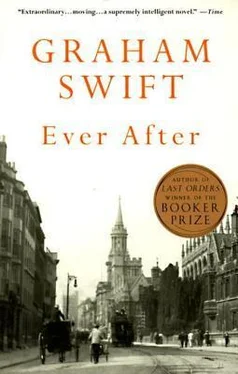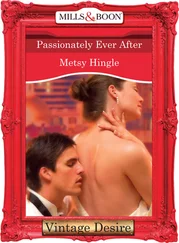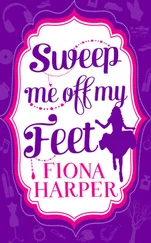It has a gentle, modest tick-tock. A crystalline, elfin chime. Inlaid in the rosewood, above the face, are little scrolls, rosettes and a pair of cupids. On the hinged brass plate at the back, which covers the winding mechanism, is engraved M. & E. 4th April 1845 , and above this, the motto, Amor Vincit Omnia . All of which my mother interpreted for me long ago, before our Paris days.
“It’s Latin, darling. You’ll learn Latin at school. ‘Love conquers all.’ If only it were true.”
Then she told me the tale, such as she herself knew it, and with a tolerant sigh, of Matthew Pearce. A rare exception to her story-telling habits.
Now that I have the Notebooks, now that I know so much more about Matthew, the clock has taken on a new significance for me — not that it wasn’t always an object of special value. If its discreet face had eyes and a mouth, it could tell me so much more (than even my scholarly surmises) about Matthew — and Elizabeth. It is a simple deduction that Matthew himself must once have opened the little hinged plate and turned the key. But only now does that fact seem extraordinary, mysterious, teasing — like the fact that Matthew wrote the sloping, regular hand (expressing such irregular thoughts) that fill the Notebooks. That when I open their pages, I open, I touch, the pages that he once touched. I occupy, as it were, his phantom skin.
The little brass winding-key, with its trefoil handle, is, so far as I know, the original key. After we acquired the clock (I told Ruth its history), it somehow became Ruth’s self-appointed task to keep it wound. It was a point of some concern to her that she should not allow the clock to stop, at least — given her frequent trips away — while she was able to attend to it. I wind it now. Ever since that moment of panic, less than two days after her death, when I remembered that the clock had not been wound (but it had not stopped), it has been my resolution never to let the clock wind down. I cannot explain this. This was before Matthew entered my life. When I wind the clock, I hold the key which Ruth once held, and holding the key that Ruth once held, I hold the key once held by Matthew.
The people go; the patterns remain. Something like that …
It is a moot point why this little clock which presided not only over Matthew’s marriage but over his scandalous divorce, and seems to have presided since over a good many marred marriages, including my mother’s to my father, should have become such a token of nuptial good will. Elizabeth might so readily have disposed of it. She might — who knows? — have picked it up and sent John Pearce’s loving handiwork smashing to pieces. Yet, when her second marriage had already fallen on hard times (this would have been after she received Matthew’s letter) she gave it to her daughter as a blessing on hers.
But I think I know why. There is surely no other explanation. She kept the clock, and passed it on, for the same reason that she kept the letter and the Notebooks. For the same reason that the clock has kept its perversely benign status (“One day, sweetie, when you get married …”). For the same reason that we keep, in spite of all, in spite of ourselves, certain things it proves impossible not to keep.
Matthew was a clockmaker’s son, from Launceston in Cornwall, who one day fell in love with the daughter of a vicar from a village in Devon and married her and had children, and it seemed they would all live happily ever after. Then one day Matthew told the vicar that he no longer believed in God. Result: scandal, divorce, Matthew’s unseemly exit from the village, never to show his face there again …
Thus, my mother’s version (“They took things seriously in those days, darling”), first told to me one day as she wound the clock, when I must have been seven or eight, and never significantly enlarged since.
The Notebooks; the letter to Elizabeth: my “line of research.” There is no stipulation in the terms of the Ellison Fellowship that prevents the appointee from switching subjects. Complication — resentment — number two. I had no wish — whatever the College planned — to give up my scheduled tutoring of first- and second-year students in the Elizabethans and Jacobeans (always my strong period). But I happened to have drop into my lap what is the dream of every scholar, if granted to few, not even to those proudly inured cases (this place abounds with them) who have toiled for decades, heroically but aridly in their chosen fields, without ever stumbling across the spring of something Original or New. I was the owner of hitherto undiscovered material , of fresh data , of (I am quoting Potter now, but what the hell?) “an historical document of enormous value — a testimony to the effects on a private life of ideas that shook the world” (he had slipped — anticipatorily, perhaps — into his media style).
It was therefore my duty — let alone my new-found, galvanizing purpose — to give full priority to this matter. To see that it was properly presented (a book: editorial preface; introduction; notes) to the world of learning, if not to the public at large. My only mistake was to have spoken when I did to our resident whiz kid (history of Victorian ideas a speciality); to have shown him (goddammit!) the manuscripts. To have become, once more, persona grata at the Potter dinner table — an enviable privilege, I gather — but no longer for my cachet (though Katherine Potter is another matter) as a refugee from show-business and grief.
Potter’s argument was, of course, that by the same token that I had a duty, in respect of the manuscripts, to the community of learning, so I had a duty to entrust my material to a specialist best equipped to serve that purpose: i.e., an historian, i.e., Potter, him .
You see, we old, doddering savants, we harmless, cloistered fools, are real cutthroats, when it comes to it. There is no fury and spite, no venomous chicanery, like that of the thwarted scholar. We are bandits, pirates, pillagers, when it comes to that all-important stuff: recognition. I can see now why men have duelled over questions of attribution, why they have come to blows in laboratories, why they have fought over who shall be first to name some particular species of plant or spider — why they have journeyed to the ends of the earth just to find some hitherto unknown species on which to bestow their names. No one owns knowledge (Potter’s own argument): what does it matter if the unimagined Amazonian beetle is named after Miller or Müller or Martini?
So why should I be so possessive? Why not yield to Potter, to the community of learning, the pool of knowledge, or whatever? Why should I hug Matthew Pearce to me and not want to let him go? What is he to me? And why should it be my task to set him before the world?
And I have not even begun to write the “book”—the “edition”—which is my purported justification for being here. Perhaps now, in my changed state, I never shall. I don’t know at what point the “book,” the scrupulously scholarly exercise, ceased to matter, if it ever mattered. You see, it is the personal thing that matters. The personal thing. It is knowing who Matthew Pearce was . And why he should matter so much to me. And why things mattered so much to him, when (what difference did it make? What difference does it make?) he might have gone on living happily ever after.
Plymouth, 12th April 1869
My Dearest Elizabeth,
I beg you to forgive this liberty in writing and in reawakening the pain of some nine years ago. Yet I take the further liberty of presuming that perhaps in those nine years I have not been wholly absent from your thoughts (as you, indeed, have lodged permanently in mine) and that you may agree with me, at least on our little private scale of things, that the past is not easily to be dismissed.
Читать дальше












